You can easily grow five anxiety-easing herbs on your windowsill: chamomile, lavender, holy basil, lemon balm, and peppermint. These herbs thrive in well-draining soil and sunny spots. Chamomile and lavender promote relaxation, while holy basil reduces stress hormones. Lemon balm improves sleep quality and aids digestion, and peppermint acts as a natural muscle relaxant. Harvest chamomile flowers when fully open, and prune lavender regularly for bushier growth. Steep fresh or dried leaves in hot water to make soothing teas. With minimal care, you'll have a readily available source of natural calm right at your fingertips. Discover how these aromatic plants can transform your daily routine and enhance your well-being.
Key Takeaways
- Choose sunny windowsills for chamomile, lavender, and holy basil; partial shade for lemon balm and peppermint.
- Use well-draining potting soil and containers with drainage holes for all herbs.
- Harvest chamomile flowers when fully open, and regularly prune lavender and lemon balm for bushier growth.
- Steep dried chamomile flowers, holy basil leaves, or fresh lemon balm for calming teas.
- Crush peppermint leaves to release menthol for immediate anxiety relief or add to teas and baths.
Calming Chamomile

A steaming cup of chamomile tea can be your gateway to tranquility. This gentle herb has been used for centuries to promote relaxation and ease anxiety. You'll find it easy to grow chamomile on your windowsill, requiring minimal care and space.
To start, choose between Roman or German chamomile varieties. Roman chamomile is a perennial that grows low to the ground, while German chamomile is an annual that grows taller. Both produce daisy-like flowers with yellow centers and white petals.
Plant your chamomile seeds in well-draining soil and place the pot in a sunny spot. Water regularly, but don't overdo it – chamomile prefers slightly dry conditions.
As your plant grows, you'll notice its feathery leaves and sweet, apple-like scent. Harvest the flowers when they're fully open, typically in the morning after the dew has dried.
To make tea, steep 2-3 teaspoons of dried flowers in hot water for 5-10 minutes. You can also use fresh flowers, but you'll need about twice as much. Enjoy your homegrown chamomile tea to soothe your nerves and promote better sleep.
Soothing Lavender
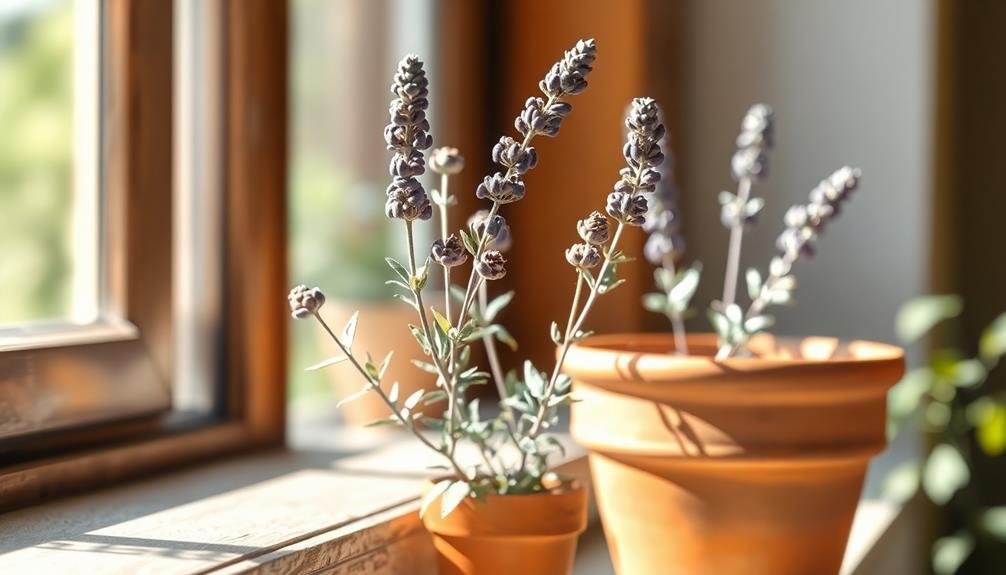
While chamomile offers gentle relaxation, lavender brings a potent aromatic punch to anxiety relief. This fragrant herb has been used for centuries to promote calmness and improve sleep quality.
You'll find it easy to grow lavender on your windowsill, as it thrives in sunny spots with well-draining soil.
To harness lavender's soothing properties, you can:
- Steep dried lavender flowers in hot water for a calming tea
- Add a few drops of lavender essential oil to your pillow for better sleep
- Create a relaxing sachet by filling a small cloth bag with dried lavender buds
When you're feeling stressed, simply rubbing the plant's leaves between your fingers can release its calming scent.
Lavender's versatility extends beyond its anxiety-easing effects, as it's also known for its antimicrobial and anti-inflammatory properties.
To care for your lavender plant, guarantee it receives plenty of sunlight and allow the soil to dry between waterings.
Prune it regularly to encourage bushier growth and more abundant blooms.
With proper care, you'll have a continuous supply of this anxiety-busting herb right at your fingertips.
Stress-Busting Holy Basil
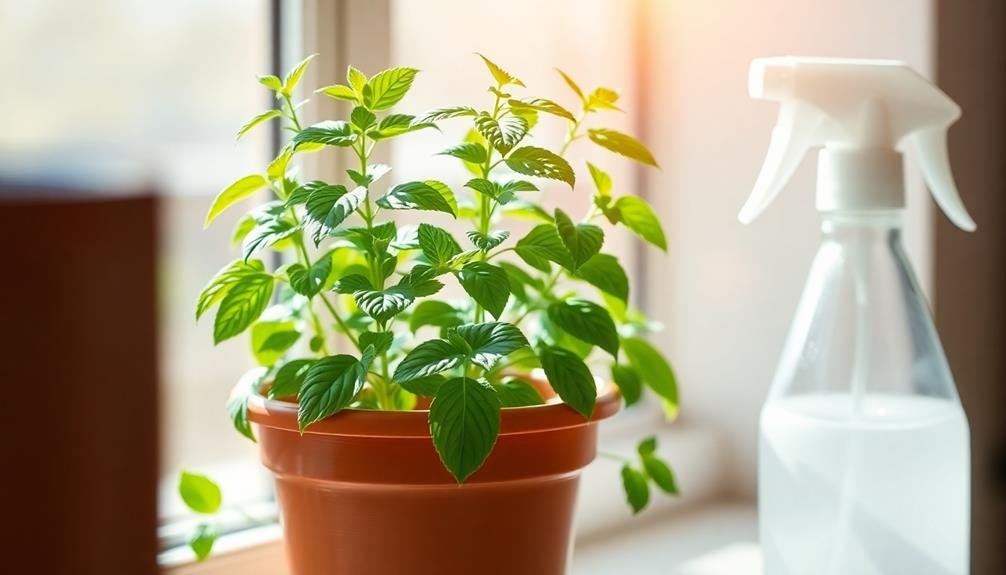
Harnessing the power of Ayurvedic medicine, holy basil (Ocimum sanctum) stands out as a potent stress-buster among anxiety-easing herbs. Also known as tulsi, this aromatic plant has been revered for centuries in India for its ability to promote mental clarity and reduce stress.
You'll find that growing holy basil on your windowsill not only adds a fragrant touch to your space but also provides easy access to its calming benefits.
To cultivate holy basil, choose a sunny spot and plant the seeds in well-draining soil. Water regularly, but avoid overwatering. As the plant grows, you can harvest the leaves to make a soothing tea or add them to your meals for a subtle, peppery flavor.
Holy basil contains compounds that help lower cortisol levels, the body's primary stress hormone. Regular consumption may improve your mood, enhance focus, and boost your overall resilience to stress.
For maximum benefits, steep fresh or dried holy basil leaves in hot water for 5-10 minutes. You can drink this tea up to three times daily.
Uplifting Lemon Balm
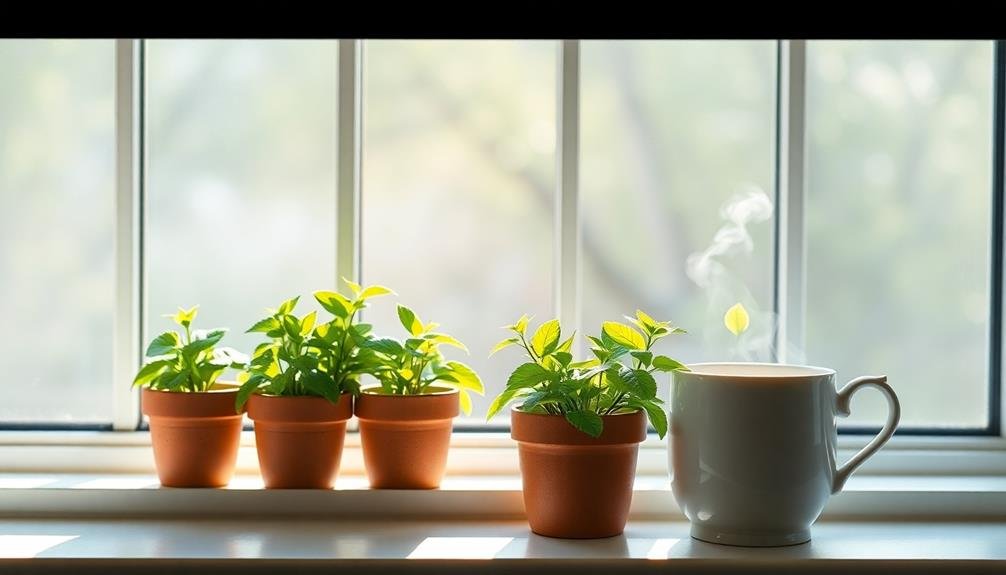
Have you ever caught a whiff of lemon balm and instantly felt your mood lift? This fragrant herb, also known as Melissa officinalis, has been used for centuries to ease anxiety and promote relaxation. Its lemony scent and delicate leaves make it a perfect addition to your windowsill herb garden.
Lemon balm is easy to grow and maintain, thriving in partial shade and well-drained soil. You can start from seeds or cuttings, and it'll quickly establish itself in a small pot. Regular pruning encourages bushier growth and prevents the plant from becoming leggy.
The benefits of lemon balm extend beyond its pleasant aroma:
- It can help reduce stress and improve sleep quality
- Lemon balm tea may alleviate digestive issues and headaches
- Its leaves can be used in cooking to add a subtle citrus flavor
To use lemon balm for anxiety relief, try steeping fresh leaves in hot water for a soothing tea. You can also add the leaves to salads, smoothies, or use them as a garnish.
For a quick mood boost, simply crush a leaf between your fingers and inhale the calming scent. With its versatility and anxiety-easing properties, lemon balm is an excellent choice for your home herb collection.
Relaxing Peppermint
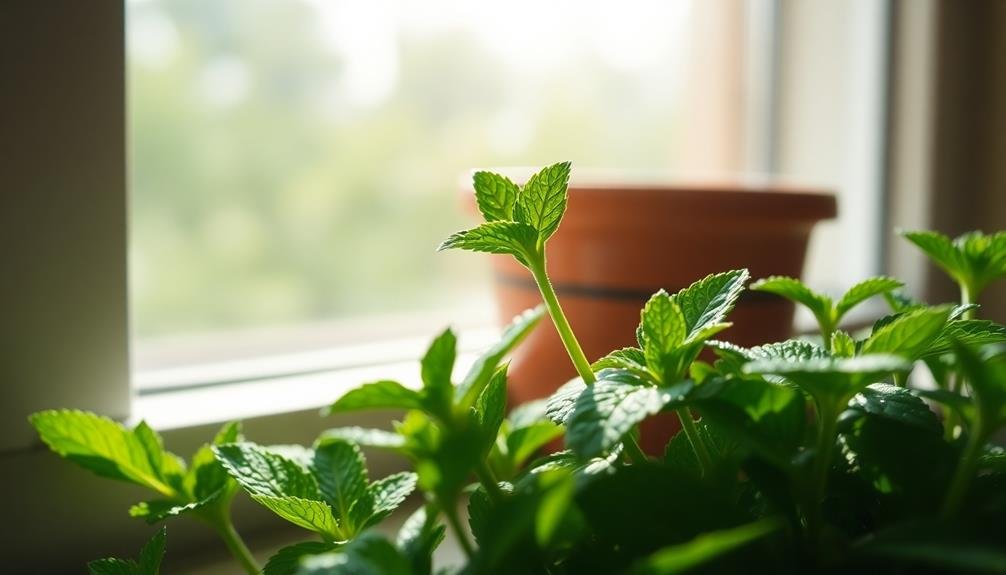
Peppermint's cooling sensation and invigorating aroma make it a popular choice for anxiety relief. This versatile herb can help soothe your nerves and improve your mood. When you're feeling stressed, simply crush a few leaves between your fingers and inhale deeply. The menthol in peppermint acts as a natural muscle relaxant, easing tension throughout your body.
Growing peppermint on your windowsill is easy and rewarding. Plant it in a well-draining pot with rich soil, and place it in a spot that receives partial sunlight. Water regularly, but don't overdo it – peppermint prefers slightly moist soil. Pinch off the growing tips to encourage bushier growth and prevent flowering, which can alter the herb's flavor.
You can use peppermint in various ways to combat anxiety. Brew a calming tea by steeping fresh leaves in hot water for 5-10 minutes. Add crushed leaves to your bath for a relaxing soak. Or, create a revitalizing room spray by mixing peppermint essential oil with water.
Frequently Asked Questions
How Long Does It Take for These Herbs to Grow Indoors?
You'll find that indoor herbs grow at varying rates. Some fast-growing varieties like basil can be ready in 3-4 weeks, while others may take 2-3 months. It's best to check specific growth times for each herb you're cultivating.
Can These Herbs Be Used in Cooking as Well as for Anxiety Relief?
Yes, you can use these herbs for both anxiety relief and cooking. They'll add flavor to your dishes while potentially helping you relax. Incorporate them into teas, sauces, or garnishes. You'll enjoy their dual benefits in your daily life.
Are There Any Potential Side Effects From Consuming These Herbs Regularly?
You should be aware of potential side effects from regular herb consumption. While generally safe, some herbs can cause digestive issues, allergic reactions, or interact with medications. It's best to consult your doctor before using them medicinally.
What's the Best Way to Harvest and Dry These Herbs for Storage?
You'll want to harvest herbs in the morning after dew evaporates. Cut healthy stems, bundle them, and hang upside down in a dark, dry place. Once crisp, strip leaves and store in airtight containers away from light.
Do These Herbs Require Any Special Care or Fertilizers When Grown Indoors?
You'll find these herbs don't need special care indoors. Use well-draining soil and provide adequate sunlight. Water when the top soil feels dry. A balanced, organic fertilizer every few weeks during growing season is sufficient for most herbs.
In Summary
You've now discovered five powerful herbs that can help ease your anxiety, all of which you can grow right on your windowsill. By incorporating these natural remedies into your daily routine, you'll be taking a proactive step towards better mental health. Remember, nurturing these plants isn't just about growing herbs; it's about cultivating peace of mind. So get your hands dirty, breathe in the calming scents, and watch your stress melt away with each leaf you tend.

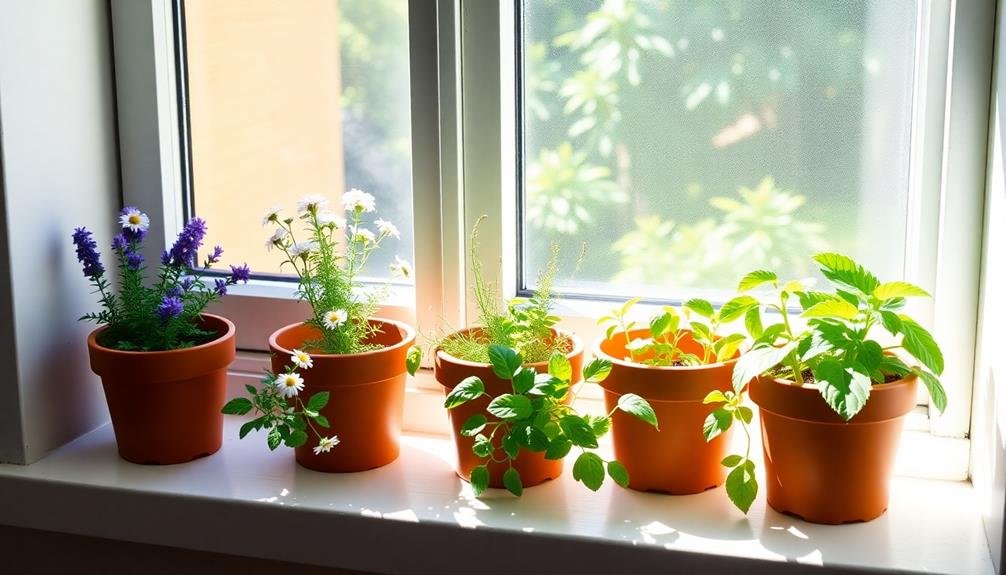

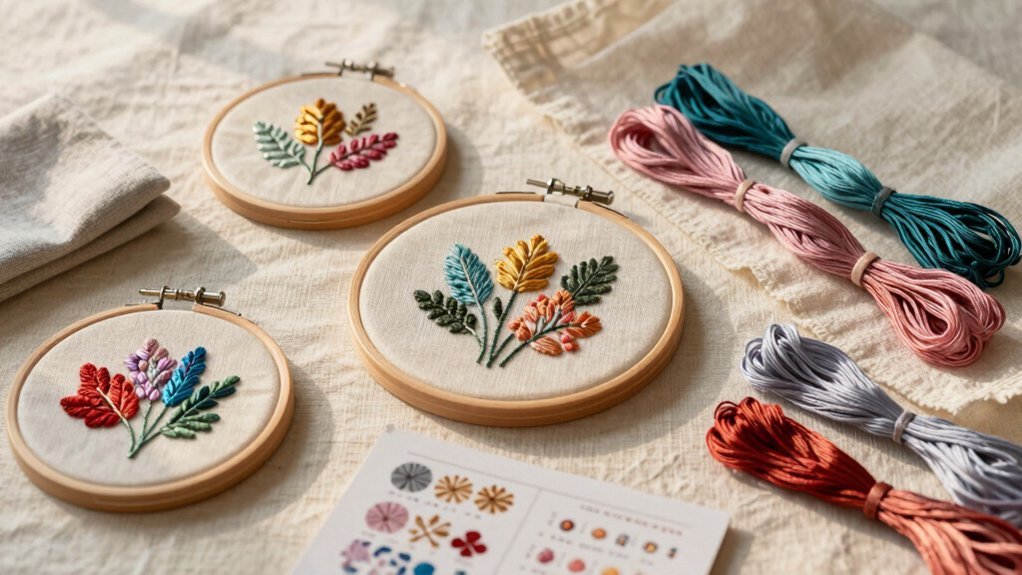

Leave a Reply